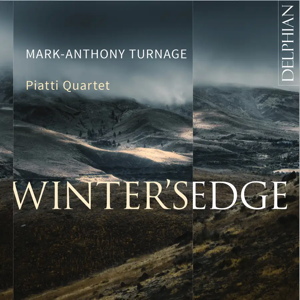
Mark-Anthony Turnage (b. 1960)
Shroud (2016)
Winter’s Edge (2016-2017)
Piatti Quartet
rec. 2022, Holy Trinity Church, Weston, UK
Reviewed as a digital download from a press preview
Delphian DCD34254 [52]
Cards on the table: I have not always been the biggest admirer of the work of Mark-Anthony Turnage, not always convinced by the fusion of disparate musical styles that others raved about. Perhaps it is maturity in either him or me, or perhaps it is the limitations imposed upon Turnage by writing for string quartet. Whatever the reason, I found the different elements that have made up his style seemed to fuse together in a more impressive way in what are in effect his third and fourth string quartets.
Both are works of austere beauty. The earlier, Shroud, commemorates the loss of close friends but even Winter’s Edge, written for the happier occasion of the 80th birthday of the composer’s mother and commissioned by the Piatti Quartet, has a bracing, clear eyed severity. Both works have let in a strong influence of English folk song which gives them a rough hewn directness in terms of their melodic inspiration.
I am a latecomer to their merits of the Piatti Quartet. I greatly enjoyed their brilliant coupling of works by Ina Boyle, Ireland, Moeran and Vaughan Williams. For a composer whose early reputation was as an iconoclastic genre-bending bad boy, it is striking how much these two pieces by Turnage can easily fit in the tradition exemplified by that earlier recording. The Piattis are equally dazzling in both.
If Shroud is the full winter of the spirit following bereavement, then, as its name suggests, Winter’s Edge captures that moment when Autumn, whether literally or metaphorically, gives way. Working backwards its long final movement, in a quiet, calm way, seems to be a working through to acceptance. The preceding movements in different ways explore contrasting reactions to the onset of Winter which it is hard not to hear as symbolic of the oncoming of old age with its intimations of mortality. In contrast to the agonies of Shroud, the feelings behind Winter’s Edge seem more nostalgic, regretful, more full of deepening shadows even in its more lively passages.
David McDade
Help us financially by purchasing from


















